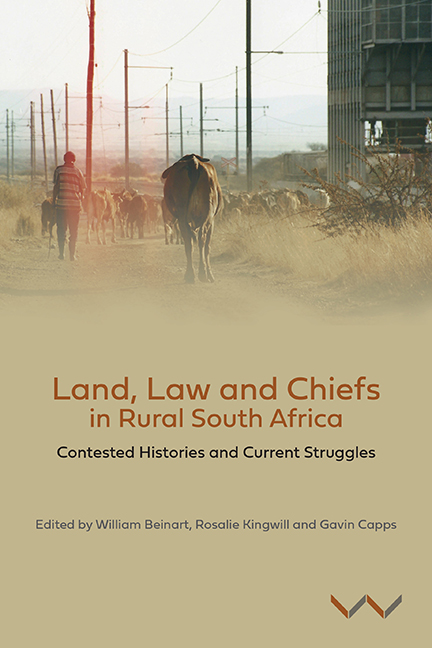Book contents
- Frontmatter
- Contents
- Maps
- Acronyms and Abbreviations
- Preface
- Introduction Land, Law and Chiefs: Contested Histories and Current Struggles
- Chapter 1 Constitutional Court Judgments, Customary Law and Democratisation in South Africa
- Chapter 2 Was ‘Living Customary Law’ There All Along?
- Chapter 3 When Custom Divides ‘Community’: Legal Battles over Platinum in North West Province
- Chapter 4 Chiefs, Mines and the State in the Platinum Belt: The Bapo-ba-Mogale Traditional Community and Lonmin
- Chapter 5 Mining, Graves and Dispossession in Mpumalanga
- Chapter 6 The Abuse of Interdicts by Traditional Leaders in South Africa
- Chapter 7 Resisting the Imposition of Ubukhosi: Contested Authority-Making in the Former Ciskei
- Chapter 8 Black Landlords, Their Tenants and the Native Administration Act of 1927
- Chapter 9 Customary Law and Landownership in the Eastern Cape
- Chapter 10 A History of Communal Property Associations in South Africa
- Chapter 11 ‘This is Business Land’: The Hlolweni Land Claim, 1983–2016
- Chapter 12 Restitution and Land Rights in the Eastern Cape: The Hlolweni, Mgungundlovu and Xolobeni Cases
- Contributors
- Index
Introduction - Land, Law and Chiefs: Contested Histories and Current Struggles
Published online by Cambridge University Press: 15 June 2021
- Frontmatter
- Contents
- Maps
- Acronyms and Abbreviations
- Preface
- Introduction Land, Law and Chiefs: Contested Histories and Current Struggles
- Chapter 1 Constitutional Court Judgments, Customary Law and Democratisation in South Africa
- Chapter 2 Was ‘Living Customary Law’ There All Along?
- Chapter 3 When Custom Divides ‘Community’: Legal Battles over Platinum in North West Province
- Chapter 4 Chiefs, Mines and the State in the Platinum Belt: The Bapo-ba-Mogale Traditional Community and Lonmin
- Chapter 5 Mining, Graves and Dispossession in Mpumalanga
- Chapter 6 The Abuse of Interdicts by Traditional Leaders in South Africa
- Chapter 7 Resisting the Imposition of Ubukhosi: Contested Authority-Making in the Former Ciskei
- Chapter 8 Black Landlords, Their Tenants and the Native Administration Act of 1927
- Chapter 9 Customary Law and Landownership in the Eastern Cape
- Chapter 10 A History of Communal Property Associations in South Africa
- Chapter 11 ‘This is Business Land’: The Hlolweni Land Claim, 1983–2016
- Chapter 12 Restitution and Land Rights in the Eastern Cape: The Hlolweni, Mgungundlovu and Xolobeni Cases
- Contributors
- Index
Summary
BACKGROUND
The past two decades have witnessed growing competition for landed resources across much of sub-Saharan Africa, generating pervasive conflict over the ownership and control of communal property and the systems of customary authority that typically mediate access to it (Peters 2004, 2013; Ubink and Amanor 2008; Capps 2016; Buthelezi, Skosana and Vale 2019). This collection brings together a range of essays that explore the ways in which these struggles are unfolding in the South African countryside. They focus particularly on the intersections between law, history and academic research in current efforts to advance popular rights to land. They also examine political conflicts, above all in relation to the powers of the chieftaincy within and beyond the areas of customary or communal landholding, largely in what were formerly defined as the ‘black homelands’ or ‘Bantustans’. The backdrop to the collection is shaped by the confluence of two important developments in the post-apartheid era, which are simultaneously redrawing the contours of the rural political economy and intensifying contestation over its future direction.
The first of these developments arises from the distinctive character of South Africa's national land reform programme. After the official end of apartheid in 1994, the new African National Congress (ANC) government adopted a multipronged approach to undo the gross racial inequalities in access to and control over land arising from white political domination and apartheid. Laws were passed and policies developed providing for: the restitution of land to black people who had been forcibly dispossessed by the state after 1913; the subsidised redistribution of land from willing white sellers to black landholders; the reform of land tenure in the communal areas to clarify rights of occupation, ownership and use; the protection of informal and customary landholdings; and new instruments of collective ownership called communal property associations (CPAs). Since local land management in the Bantustans had typically (though not exclusively) been placed under chieftaincies or tribal authorities during apartheid, these interventions inevitably raised questions about the future role and powers of those institutions in the new dispensation.
The 1996 Constitution enshrined democracy, the rule of law and universal rights. It also recognised customary laws and practices, to the extent that they were compatible with the Constitution more broadly. This raises complex issues in relation to land reform and tenure.
- Type
- Chapter
- Information
- Land, Law and Chiefs in Rural South AfricaContested histories and current struggles, pp. 1 - 20Publisher: Wits University PressPrint publication year: 2021



